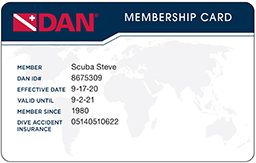Health Considerations
Most divers are accustomed to thinking about maintaining fitness to dive, avoiding the bends and minimizing the risks of marine life injuries. But all divers are also travelers and should be aware of travel-related medical conditions.
Dehydration
What is it? Depletion of water and other bodily fluids. Can impair body’s ability to carry out normal functions.
Why does it affect travelers? Whether traveling by car, bus, train, air, or boat, you may lack convenient access to drinking water. Air travel is particularly dehydrating because the air on planes
is very dry.
What to do: Prevent dehydration by bringing one or two bottles of water in your carry-on. While traveling, check your urine. If it is dark, drink some fluids right away. If you notice extreme thirst, lack of urination, withered skin, dizziness, or confusion, refrain from diving and seek immediate medical care.

Deep Vein Thrombosis (DVT)
What is it? When blood clots form in the body’s deep veins, usually in the legs. Can lead to life-threatening conditions such as pulmonary embolism or stroke.
Why does it affect travelers? Long periods of inactivity inhibit normal blood circulation.
What to do: Whether you’re driving or flying, make sure to get up and stretch your legs from time to time. If you know you are at increased risk for DVT, wear compression socks and consult with your doctor about taking clot-preventatives. See DAN’s online Health & Diving library for more information.
Foodborne Illness
What is it? When food incubates bacteria, transmits disease from person to person or animal to human, or carries other toxins (as with poisonous fish). Can be fatal or cause life-threatening symptoms in extreme cases.
Why does it affect travelers? According to the CDC, travelers’ diarrhea is the most common
illness affecting travelers and may occur in up to 50 percent of international travelers. It often
results from consuming improperly handled food or untreated water.

What to do: Avoid raw or undercooked meat and seafood as well as raw fruits and vegetables, untreated water and ice cubes, and any food you suspect may have been prepared in unhygienic conditions.
Vector-Based Diseases
What are they? Illnesses transmitted by mosquitoes, ticks, fleas, and other insects. These diseases include chikungunya, dengue fever, malaria, and others.
Why do they affect travelers? They don’t affect travelers per se, but rather are endemic to certain areas of the world.
What to do: Find out whether your travel destination carries a risk for vector-borne disease and take appropriate precautions, which may include vaccination, insect repellant, or avoiding certain behaviors or environments.
QUICK TIP:
Research any endemic diseases or special conditions to which you may be exposed, especially if you plan to travel internationally. These can range from malaria to heat stroke. The Centers for Disease Control and Prevention (CDC.gov) is a great resource for comprehensive information on current alerts and common diseases in your destination.
Flying After Diving
Flying to a destination near sea level before diving poses virtually no risk. Flying after diving, however, increases decompression stress, since the pressure in an aircraft cabin is lower than ground-level atmospheric pressure. DAN recommends you follow these guidelines when traveling:
| Dive Profile | Minimum Preflight Surface Interval Suggestion |
| Single no-decompression dive | 12 hours or more |
| Multiple dives in a day | 18 hours or more |
| Multiple days of diving | 18 hours or more |
| Dives requiring decompression stops | Longer than 18 hours |
Please remember that any postdive ascent to a higher altitude – even using ground transportation – increases your decompression stress.
Bring DAN With You
DAN is here for you 24 hours a day, every day, anywhere in the world. If you need non-emergency medical information or assistance, visit DAN.org or call the medical information line at +1 (919) 684-2948 during normal business hours. In the event of an emergency, here’s what you should know before you call:

- Contact local emergency medical services (EMS) immediately. After EMS is activated, call DAN for additional assistance.
- The emergency number on the back of your DAN card (+1-919-684-9111) accepts direct and collect calls, but countries vary in how to make collect calls. To make a collect call from within
the United States, replace the country code with a 0. When traveling outside of the United States, research that country’s collect calling protocol and EMS numbers prior to departure. - When you call, you’ll need to provide the following information:
- Your name
- The name of the injured person
- Your location
- A call-back number
- A description of the emergency
- Names of prescription medications you are currently taking
- Any pre-existing health issues or concerns
- The DAN Emergency Hotline also serves as your resource for activating DAN’s TravelAssist benefits, including medical evacuation.
WHO TO CALL
Emergency Procedures:
STEP 1. Call 911 or local EMS if abroad
STEP 2. Call DAN’s Emergency Hotline (+1-919-684-9111)
Non-Emergency Procedures:
STEP 1. Call DAN’s Non-Emergency Medical Information Line (+1-919-684-2948)
QUICK TIP:
Whether you’re traveling domestically or internationally, research the availability and location of emergency medical services at your destination. Adjust your dive plan accordingly and have a realistic emergency action plan.
Next: Gear Care Guidelines >